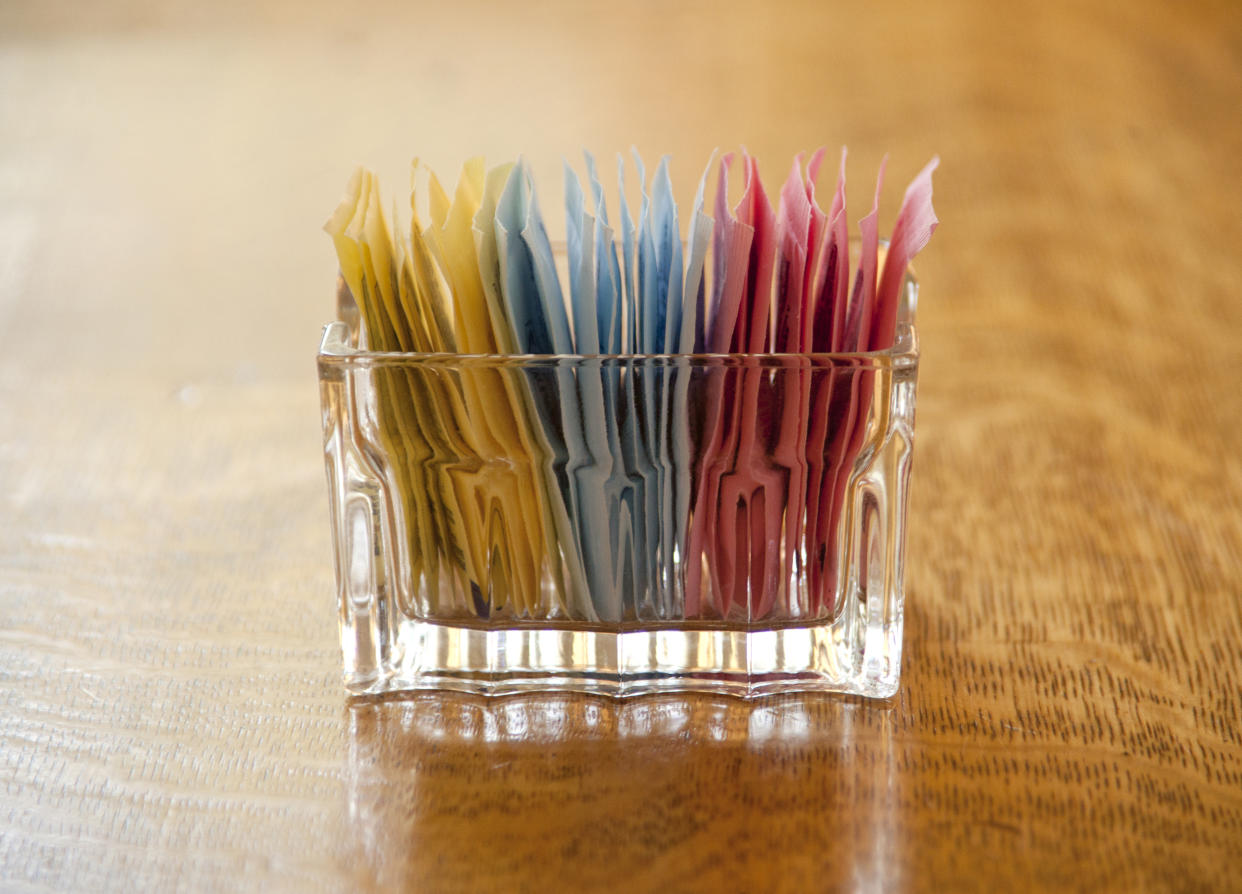Are artificial sweeteners worse than sugar? How they compare, according to a dietitian.

It’s no secret that too much added sugar is bad for us. Sugar-rich food and beverages such as soda, cakes, pastries, candy, syrups and other sweets have long been linked with a myriad of health issues including obesity, heart disease, diabetes, gout and more. But are sugar substitutes the antidote or worse than sugar itself? Here’s what the latest evidence says about sugar, artificial sweeteners and other sugar substitutes — and how they compare.
What are artificial sweeteners and other sugar substitutes?
Over the years the range of sugar substitutes has expanded, and today there are a dizzying array of sugar alternatives available, each with its own flavor and risk profile. Sugar substitutes fall into three main categories: artificial sweeteners, sugar alcohols and other low-calorie sweeteners. All of those listed below are generally regarded as safe by the Food and Drug Administration.
Artificial sweeteners
Artificial sweeteners, which are created in a lab, are 200-20,000 times sweeter than table sugar. There are six FDA-approved sweeteners: acesulfame potassium (Ace-K), advantame, aspartame, neotame, saccharin and sucralose. They provide fewer calories than sugar — with 0-2 calories per teaspoon compared to 16 calories per teaspoon in sugar. The only exception is aspartame, which provides the same amount of calories as sugar per gram but is typically used in small quantities.
Sugar alcohols
Sugar alcohols include erythritol, xylitol, maltitol, mannitol and sorbitol. They are 25%-100% as sweet as sugar, found naturally in some foods like fruit and vegetables and contain fewer calories than sugar — 1.5-3 calories per gram, compared to 4 calories per gram for sugar. Sugar alcohols have been increasingly popular over the years because they have less of an aftertaste than artificial sweeteners.
Other low-calorie sweeteners
Sweeteners such as steviol glycosides (stevia), monk fruit, D-allulose, D-tagatose and isomaltulose occur naturally and vary in sweetness depending on the ingredient. For example, allulose is 0.7 times as sweet as sugar, while stevia is up to 400 times sweeter than sugar. The calorie content also varies. Steviol glycosides and monk fruit have 0 calories, while allulose provides 0.2-0.4 calories per gram (about 10% of the calorie content of sugar).
How does sugar compare to artificial sweeteners and sugar substitutes?
Calories
Compared to sugar, artificial sweeteners and sugar substitutes have fewer calories per gram and can be used in smaller quantities than sugar to deliver the same amount of sweetness. That’s why many products that contain artificial sweeteners and sugar substitutes are lower in calories than their sugar-containing equivalents. For this reason, studies show that replacing sugar with artificial sweeteners and sugar substitutes in general can be helpful for weight loss, while excess sugar can contribute to weight gain and obesity.
Taste
Some sugar substitutes taste better than others, but the consensus is that regular sugar tastes better overall. Among sugar substitutes, erythritol, monk fruit, allulose and steviol glycosides taste the most like sugar, while artificial sweeteners like aspartame leave a metallic, bitter aftertaste for many.
Health and safety
This is where the sugar vs. sugar substitutes debate gets sticky (pun intended), especially as new studies like this one on xylitol and heart disease become part of the conversation.
Weight loss: Swapping out sugar for sugar substitutes may help with calorie reduction and weight loss. However, few studies have looked at the relationship between sugar alcohols and weight management. Contrary to popular belief, sugar substitutes do not appear to trigger a preference for sweets, so if you’re looking to lose weight, sugar substitutes might be helpful in the short term.
Blood sugar and diabetes: Unlike sugar, most sugar substitutes have little or no effect on blood glucose levels. But that doesn’t mean they lower your risk of diabetes. Emerging evidence from large-scale studies suggests that consuming sugar substitutes increases type 2 diabetes risk. While sugar substitutes may not help prevent type 2 diabetes relative to sugar, they still might be useful for blood glucose control.
Heart disease: A growing body of evidence suggests that sugar substitutes negatively impact heart disease and stroke risk, much like sugar. Although much of the research on sugar substitutes and heart disease has come from observational trials, meaning they can’t prove cause and effect, a handful of small intervention studies have confirmed these results. As it stands today, neither excess sugar nor sugar substitutes has a favorable impact on heart health.
Digestive health and the microbiome: Digestive issues, ranging from bloating to diarrhea, are well-known side effects of sugar substitutes. Artificial sweeteners such as sucralose and aspartame can leave you running to the bathroom when consumed in excess, and sugar alcohols can trigger IBS (irritable bowel syndrome) symptoms in some. The impact of sugar substitutes on the microbiome (tiny organisms including bacteria that live in your gastrointestinal tract and influence your health) is still under investigation, but sugar substitutes don’t appear to do your GI systems any favors.
Cancer risk: Earlier research in animal models suggested that sugar substitutes could increase cancer risk when consumed in massive doses; however, this has largely been debunked. Newer studies show no link between sugar substitutes and cancer risk. Excess sugar consumption has been linked to cancer largely because of the impact that sugar has on obesity, which is a risk factor for many forms of cancer.
The bottom line
Both sugar and sugar substitutes have their pitfalls and should be consumed in moderation. While sugar substitutes generally contain fewer calories than real sugar, swapping out sugar for these substitutes is not a magic ticket to better health — and may even have a negative impact on diabetes and heart disease risk and cause gastrointestinal symptoms. For most healthy people, consuming a small amount of sugar (less than 5% of total daily calorie intake) is probably better for you than loading up on artificial sweeteners and other sugar substitutes.
Edwina Clark is a registered dietitian.


